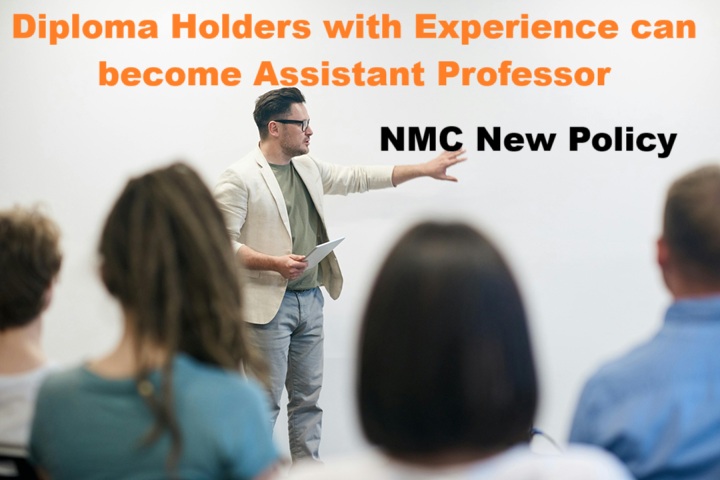Diploma Holders with Over 6 Years of Clinical Experience Can Now Become Assistant Professors – A Big Leap in India’s Medical Education
Published on: July 14, 2025
Source: www.merijobs.in
Category: Medical Careers, Assistant Professor Jobs
The landscape of medical education in India is undergoing a dynamic shift, thanks to the new regulations introduced by the National Medical Commission (NMC). In a major policy update aimed at widening the pool of medical faculty in India, the NMC has now allowed diploma holders with at least six years of clinical experience to become eligible for Assistant Professor positions in government hospitals and recognized institutions.
🔍 Why This Policy Change Matters?
India has long faced an acute shortage of medical teachers, especially in pre- and para-clinical subjects. This shortage hampers not only the quality of education but also the capacity of medical colleges to admit more students. With this landmark regulation, the NMC is now tapping into the vast experience of non-teaching doctors working in government hospitals to fill the academic vacuum.
According to the notification, these newly eligible assistant professors can now be appointed without MD/MS degrees, provided they have completed their postgraduate diploma from recognized institutions and have served in clinical practice for at least six years post-diploma. This experience must be certified by the hospital administration or competent authority.

📘 Key Highlights of the New NMC Guidelines
- Diploma holders can now be considered for the post of Assistant Professor.
- They must have at least six years of clinical experience in a government hospital.
- This move is aimed at tackling the faculty shortage in both government and private medical colleges.
- The priority for teaching roles will still be given to MD/MS degree holders, but diploma holders will be considered if no degree holders are available.
- Applicable mainly to pre- and para-clinical subjects but provisions are being discussed for clinical subjects too.
✅ Eligibility Criteria for Diploma Holders
To be eligible for appointment as an Assistant Professor under the new NMC norms, the following criteria must be met:
- Must hold a recognized postgraduate diploma in a medical specialty.
- Should have completed at least six years of clinical practice in a government or recognized institution.
- Must have relevant certification from the institution verifying clinical experience.
- Should not have previously served as a faculty member in a teaching role under regular appointment (contractual appointments may be considered).
- Preference will still be given to PG degree holders (MD/MS), but diploma holders can fill vacancies where degree holders are not available.

🎯 Objective Behind the Policy Shift
The core idea behind this bold move is to bridge the gap between clinical service and academia. Thousands of doctors with PG diplomas have been serving the healthcare system with unmatched dedication. However, their academic progression was halted due to the lack of an MD or MS qualification. This regulation gives them a pathway to contribute their expertise in shaping future generations of doctors.
It also aims to utilize the existing government hospital staff more effectively by offering them academic opportunities, which may boost morale and create new career goals for senior practitioners.
🧠 Expert Opinions
A Senior Doctor (Name not disclosed here), a senior advisor in medical education policy, welcomed the regulation stating, “It is an inclusive and progressive step. Diploma holders with extensive field experience are often more hands-on and practical in their approach. They can offer students real-world medical insights that often go missing in purely academic teaching.”
Meanwhile, some concerns have been raised that these new norms may dilute the teaching standards. However, most educationists believe that such fears are unfounded, provided that the candidates undergo regular faculty development programs (FDPs) and structured teaching assessments.
📚 Subjects and Specialties Covered
The rule largely applies to non-clinical and para-clinical subjects. These include:
- Anatomy
- Physiology
- Biochemistry
- Microbiology
- Pharmacology
- Community Medicine
Specialties like Anaesthesia, Radiology, Obstetrics, and Gynecology where practical skills are vital may also come under this regulation, provided approval is given by the Medical Council.

📜 Application & Appointment Process
- Eligible doctors must apply through their institution’s designated academic recruitment cell.
- All experience-related documents must be certified by the Medical Superintendent or Head of Department.
- The selection process may include an interview, academic screening, and evaluation by a selection committee.
- Initial appointments are often made on a contractual basis, later becoming regularized upon satisfactory performance and training completion.
📈 How This Policy Helps India’s Healthcare Education
India currently has over 700 medical colleges and the number is rapidly growing. However, many of them face delays in receiving recognition due to a shortage of qualified faculty. By tapping into experienced clinical practitioners already working in government hospitals, the NMC has offered a strategic solution to improve the quality and availability of faculty members.
This will also:
- Increase job opportunities for experienced but academically underrepresented doctors.
- Offer better patient care through teacher-practitioners who understand ground realities.
- Facilitate knowledge exchange between the public healthcare system and academic institutions.
👨⚕️ Teaching Skills & Faculty Training
The NMC has emphasized that clinical experience must be supplemented with teaching training modules. All newly appointed Assistant Professors under this scheme will need to complete a Medical Education Technology (MET) workshop and ongoing Continuing Medical Education (CME) sessions.
📌 Practical Skills Will Be Valued
The real-world, hands-on experience of these diploma holders will be a strong asset in classroom and bedside teaching. As per experts, these teachers can train students in diagnosis, emergency response, outpatient care, and administrative procedures with practical examples and situational insights.
📢 What Institutions Should Do Now
- Update their recruitment policies to align with NMC’s new regulations.
- Launch awareness campaigns to inform in-service doctors about this career upgrade opportunity.
- Create internal review panels to assess diploma holders’ clinical and academic eligibility.
- Ensure that such appointments do not replace but rather complement the efforts to bring more MD/MS-qualified faculty.
💼 Career Advice for Diploma Holders
If you’re a diploma holder with years of clinical experience, this is your moment. Start by gathering all your service records and institutional certifications. Reach out to your HR or medical director for guidance on your eligibility. Attend teaching workshops, enroll in FDPs, and stay updated with medical education trends.
📝 Final Words
This regulation is not just a step, but a leap toward inclusive, practical, and skill-based medical education in India. It respects experience, encourages career growth, and uplifts the entire healthcare education system by blending clinical service with academic excellence.
🛡️ Disclaimer
This blog has been prepared for informational purposes only .While every effort has been made to ensure accuracy and completeness, readers are advised to consult the official notifications of the National Medical Commission (NMC) or contact relevant authorities for updated and specific details regarding eligibility, appointment procedures, and subject-wise implementation.
www.merijobs.in and the author of this article do not assume any responsibility for errors, omissions, or policy changes that may affect candidates’ eligibility or recruitment outcomes. This blog is meant to serve as a knowledge resource for medical professionals and job aspirants seeking clarity on the NMC’s new guidelines regarding diploma holders becoming Assistant Professors.


Recent Comments